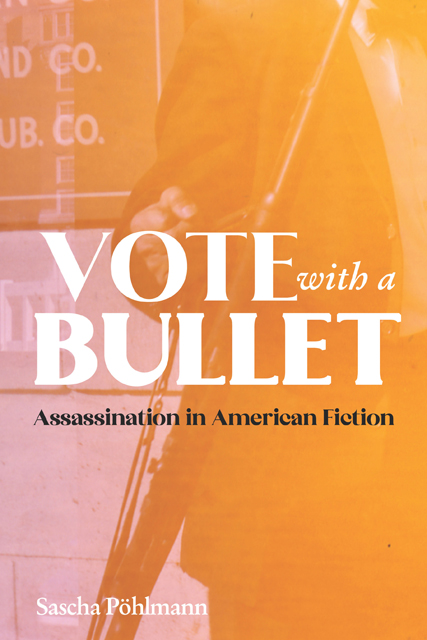Book contents
- Frontmatter
- Dedication
- Contents
- Introduction: The Individual and Society
- 1 The Princess Casamassima (1886)
- 2 The Assassination Bureau, Ltd. (1910/63)
- 3 All the King’s Men (1946)
- 4 Solar Lottery (1955)
- 5 The Manchurian Candidate (1959)
- 6 The Parallax View (1970)
- 7 Libra (1988)
- 8 The Dead Zone (1979)
- 9 11/22/63 (2011)
- 10 Big If (2002)
- 11 Checkpoint (2004)
- 12 The Good Father (2012)
- Conclusion
- Works Cited
- Index
12 - The Good Father (2012)
Published online by Cambridge University Press: 14 January 2023
- Frontmatter
- Dedication
- Contents
- Introduction: The Individual and Society
- 1 The Princess Casamassima (1886)
- 2 The Assassination Bureau, Ltd. (1910/63)
- 3 All the King’s Men (1946)
- 4 Solar Lottery (1955)
- 5 The Manchurian Candidate (1959)
- 6 The Parallax View (1970)
- 7 Libra (1988)
- 8 The Dead Zone (1979)
- 9 11/22/63 (2011)
- 10 Big If (2002)
- 11 Checkpoint (2004)
- 12 The Good Father (2012)
- Conclusion
- Works Cited
- Index
Summary
My final example of assassination fiction, Noah Hawley’s The Good Father, explores in depth the motif of assassination as a conflict of extraordinary subjectivities that is only hinted at in Checkpoint. The novel is formally remarkable for using a number of shifts in narrative perspective to consider a successful assassination from a variety of angles. Whereas some assassination novels, such as Stephen King’s The Dead Zone, employ a rather strict limitation of narrative perspective for their construction of a troubled individualism in conflict with society, The Good Father multiplies and blurs these subjective viewpoints without ever giving us what could be considered a complete picture. The assassination in question is the shooting of Democratic senator and presidential hopeful Jay Seagram during a campaign event in Los Angeles by twenty-year-old Daniel Allen, who also goes by the name of Carter Allen Cash. The novel opens with a brief and patchy report on his identity as it is pieced together by the media in the immediate aftermath, and as it is received and supplemented by the main first-person narrator in the novel, Daniel’s father Paul Allen. The novel inverts the usual structure of assassination fiction in that it opens with a successful assassination instead of leading up to one (or an attempt), and readers are not given any reason to doubt that Daniel has actually shot Seagram on stage. However, his motives remain entirely unclear, and his father has reason enough to give his estranged son the benefit of the doubt—against all odds—as he embarks on a quest to find out not so much why he did it but if he did it at all. The narrative structure thus takes readers from certainty to doubt and finally to a different certainty, as the text doubly challenges the agency and subjectivity of both Daniel and Paul, the perpetrator and the doctor-turned-detective who tries to reconstruct the events, their context, and Daniel’s personal motivation.
Paul serves as the main focalizer in the text, yet the narrative perspective is not at all clear-cut. First-person and third-person narration intertwine, and the limitations of Paul’s viewpoint are transcended by knowledge that cannot be entirely explained by his projections.
- Type
- Chapter
- Information
- Vote with a BulletAssassination in American Fiction, pp. 165 - 176Publisher: Boydell & BrewerPrint publication year: 2021

